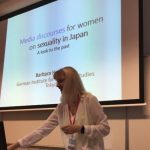イベント&アクティビティ
A New Era of Immigration? Japan’s Guest Worker Programs in Comparative Perspective
With around 1.5 million foreign workers and over a million permanent and long-term foreign residents, Japan is experiencing unprecedented levels of immigration. In 2019 three new residence statuses were added to the Immigration Control Act. Furthermore, the government promises to foster social integration by strengthening Japanese language education and providing public services in multiple languages. But access to non-temporary or even permanent resident is highly selective.
Focusing on the recent additions to Japan’s immigration control legislation, Naoto Higuchi identifies a shift from a preferential treatment of foreigners based on “blood ties” to a neoliberal model based on meritocracy. The new residence categories “Specified Skills 1 & 2” enable immigration authorities to select migrants and determine their rights and length of stay based on performance, gauged by language ability and skill acquisition. In contrast, the newly prepared visa status for fourth-generation Nikkeijin looks — at first glance — like a continuation of immigration based on ethnic selection criteria. Yet, the government changed its policy to exclude Nikkeijin from social integration by limiting their stay to maximum five-years, and the road to permanent residence is becoming increasingly based on meritocratic selection criteria. The new movements raise interesting puzzles for exploring the future of migration to Japan.
Speakers:
Naoto Higuchi, Tokushima University
Kristin Surak, University of London
Autism in the Workplace – How the Diagnosis of a Developmental Disorder Affects Employment Situations in Japan
The spread of information on developmental disorders, mainly Autism Spectrum Disorder and ADHD, as well as changes in disability employment legislation have led to an increased number of diagnoses and a heightened interest in the subject of employment for individuals on the spectrum both in Japan and in the international context. Little research exists, however, on the perspective of employees on the spectrum, their actual employment situation, the opportunities and hurdles they face, and their coping strategies.
Japanese companies and employment facilities use the designation of disability to create employment structures that often differ from general employment structures in regards to work content, remuneration, or career opportunities. Based on preliminary findings from six months of participant observation in privately organized gathering spaces for persons with developmental disabilities and qualitative interviews with the participants in those spaces, this study reveals how individuals on the spectrum make use of the employment structures provided for them, or eschew them to find different ways of employment.
Environmental Local Scales: Women’s Writing in Northern Tōhoku, Present to Postwar
Public and academic interest in literature from Japan’s rural north culminated in consecutive Akutagawa Prizes awarded to Numata Shinsuke, Wakatake Chisako, and Takahashi Hiroki in 2017 and 2018. Despite mainstream success, however, the bulk of literature published by Tōhoku writers in minor or independent magazines remains unexplored.
This talk will explore women’s writing published in northern Tōhoku in the present moment and trace legacies of local print culture from the mid-1940s. It will introduce the print history of regional women’s magazines, as well as explore the fiction and essays of women writers that are rarely included in literary histories of the period. Tōhoku writers critiqued the gender politics of the postwar moment, reconfiguring what it means to scale literature to the region or the nation. Reviewing the history of rural literary production and gendered politics of democratization uncovers legacies that connect the postwar moment to our conceptualization of regional space and literary production in Japan’s peripheries today.
Speaker
Eric Siercks, University of California
Universities in the Digital Age
Japan’s and Germany’s ambitious national frameworks of Society 5.0 and Industry 4.0 acknowledge the importance of education and research as key success factors in the digital transformation. Universities are not only to develop the necessary human capital and to contribute to technological advances, they are also to play key roles with regard to social inclusion and life-long learning. To do so, they are expected to deepen and widen cross-organizational and international cooperation. Last, but not least they are urged to adjust their core activities of teaching, research and administration to take advantage of new digital technologies. How are universities in Germany and Japan responding to these challenges? How do they see themselves affected? What strategies do they pursue? Our two speakers are best suited to answer these questions based on their leading positions and professional careers in higher education and research institutions in Germany and Japan.
Speakers:
Bernd Huber, President of Ludwig-Maximilians-Universität München
Miho Funamori, Strategy Manager at the Research Center for Open Science and Data Platform at National Institute of Informatics
User-driven Innovation in Health- & Elderly Care in Japan
Japan is enthusiastic about developing and applying innovative technology in the context of health- and elderly care. Research and development in care robotics, sensor technology (mimamori sensā), or ICT applications are widely promoted by the government. Despite these manifold efforts and activities, many devices fall short of meeting the needs expressed by users. Therefore, this DIJ Forum raises the question, what is necessary to fulfil user’s needs in healthcare? What needs to be done to improve user acceptance and usability of technology regarding innovation in health- and elderly care? Our two speakers are best suited to discuss these questions from a cross-disciplinary perspective.
Speaker:
Sarah Cosentino, Waseda University
Nobu Ishiguro, Osaka University
デジタル時代におけるシチズン・サイエンス
– 市民社会と協働した人文・社会科学研究の可能性 –

デジタル技術の進展により、市民社会に新たな機会やチャンスが生まれています。市民科学の広がりはその一例です。市民が研究活動に参画することで、市民の科学に対する意識が深まるとともに、研究活動の可能性が広がります。しかしながら、自然科学分野に比べ、人文・社会科学分野における市民科学の実例は少なく、積極的に活用されているとは言えません。自然科学とは異なる困難な課題があると思われます。
そこで、本コンファレンスでは、人文・社会科学分野における市民科学の可能性と課題に焦点を当て、その意義や影響、政策的な示唆について、内外の第一線の専門家を招聘し、議論を行います。人文・社会科学研究と市民社会の接点をどのように形成していくのか、市民科学が市民社会と人文・社会科学研究にもたらすメリットや、新たな課題、影響はどのようなものか、また、責任ある協働研究は、どのような方法で進められるべきか。これらの点について率直に議論を交わします。
The Digital Transformation – Implications for the Social Sciences and the Humanities

The two-day academic workshop – jointly organized by the German Institute for Japanese Studies (DIJ), the German Centre for Research and Innovation Tokyo (DWIH Tokyo) and the Nippon Institute for Research Advancement (NIRA) – discussed the impact of DT on the social sciences and humanities with regard to three subtopics.
It first addressed the impact of DT for research questions and research design. What questions do we need to ask and how can we make best use of DT in the way we conduct research? Second, it elaborated the possible implications of DT with regard to the dissemination of research outcomes. Finally, it considered how DT might change the organization and institutional set-up of academia. Who will conduct research? Where will it be conducted? Will disciplinary boundaries remain relevant?
The DIJ at this year’s ICAS 11
At this year’s ICAS 11 conference in Leiden, Netherlands, the DIJ was represented by papers given by Barbara Holthus, Hanno Jentzsch, and Nora Kottmann. The Max-Weber Foundation also featured a book table, with numerous publications by the DIJ on display.
For more on this, see this report (in German).











 Open Access
Open Access
